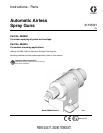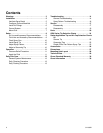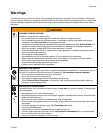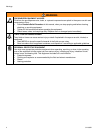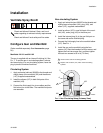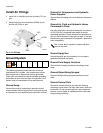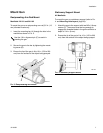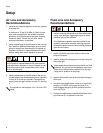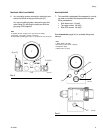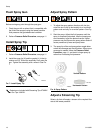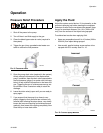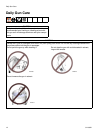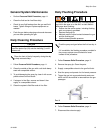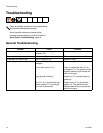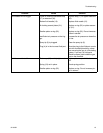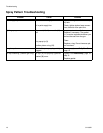
Setup
8 311053H
Setup
Air Line and Accessory
Recommendations
1. Install an air pressure regulator on the gun cylinder
air supply line.
A minimum of 70 psi (0.49 MPa, 4.9 bar) air pres-
sure must be supplied to the cylinder for proper
operation. Air pressure opens the valve, a spring
closes the valve. A three-way air valve, which
exhausts cylinder air, is required.
2. Install a bleed-type air shutoff valve on the main air
line. Install an additional bleed-type valve on each
pump air supply line, downstream of the pump air
regulator, to relieve air trapped between this valve
and the pump after the air regulator is shut off.
3. Install a bleed-type air shutoff valve on the gun air
cylinder supply line, downstream of the air regulator,
to shut off air to the gun cylinder. Connect the air
supply line to the gun cylinder air inlet (C). See Fig.
4.
Fluid Line and Accessory
Recommendations
1. Install a fluid filter and drain valve(s) close to the
pump's fluid outlet.
2. Install a fluid pressure regulator to control fluid pres-
sure to the gun.
3. Install a fluid shutoff valve to shut off the fluid supply
to the gun.
4. For paint spray applications, install an in-line fluid fil-
ter, part no. 210500, on the gun fluid inlet (F) to
avoid clogging the spray tip with particles from the
fluid. See Fig. 4.
5. Connect the electrically conductive fluid hose to the
gun fluid inlet (F) or optional in-line filter.
The bleed-type air shutoff valve is required in your sys-
tem to relieve air trapped between this valve and the
pump after the air regulator is closed. Trapped air can
cause the pump to cycle unexpectedly, which could
result in serious injury.
The cylinder air inlet accepts 1/4 in. (6.3 mm) O.D.
tubing.
• A fluid drain valve(s) is required in your system to
assist in relieving fluid pressure in the displacement
pump, hose and gun; triggering the gun to relieve
pressure may not be sufficient.
• A fluid pressure regulator must be installed in the
system if the pump's maximum working pressure
exceeds the gun's maximum fluid working pressure
(see the front cover).
Some applications require fine-tuned control of fluid
pressure. You can control fluid pressure more accu-
rately with a fluid pressure regulator than by regu-
lating the air pressure to the pump.



